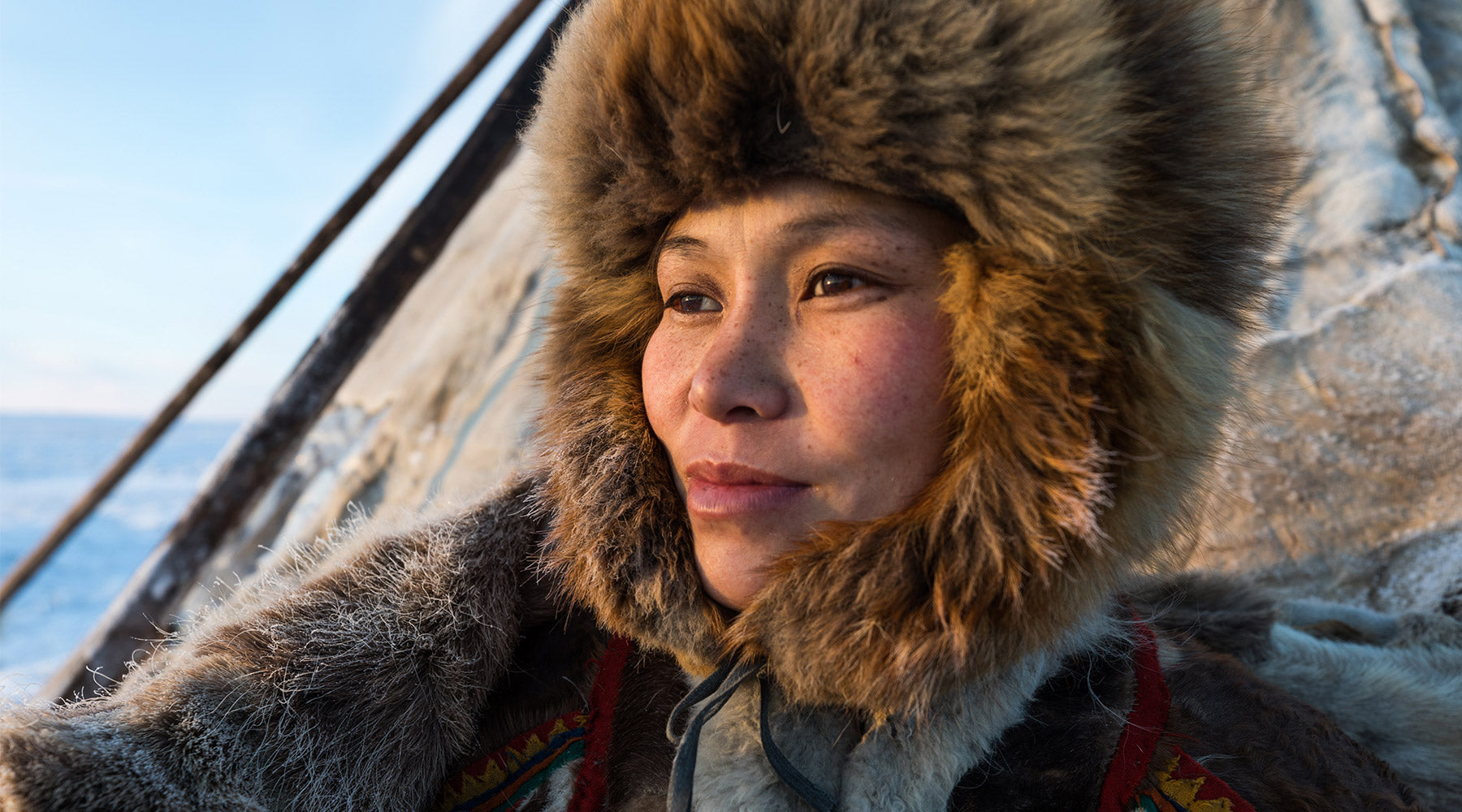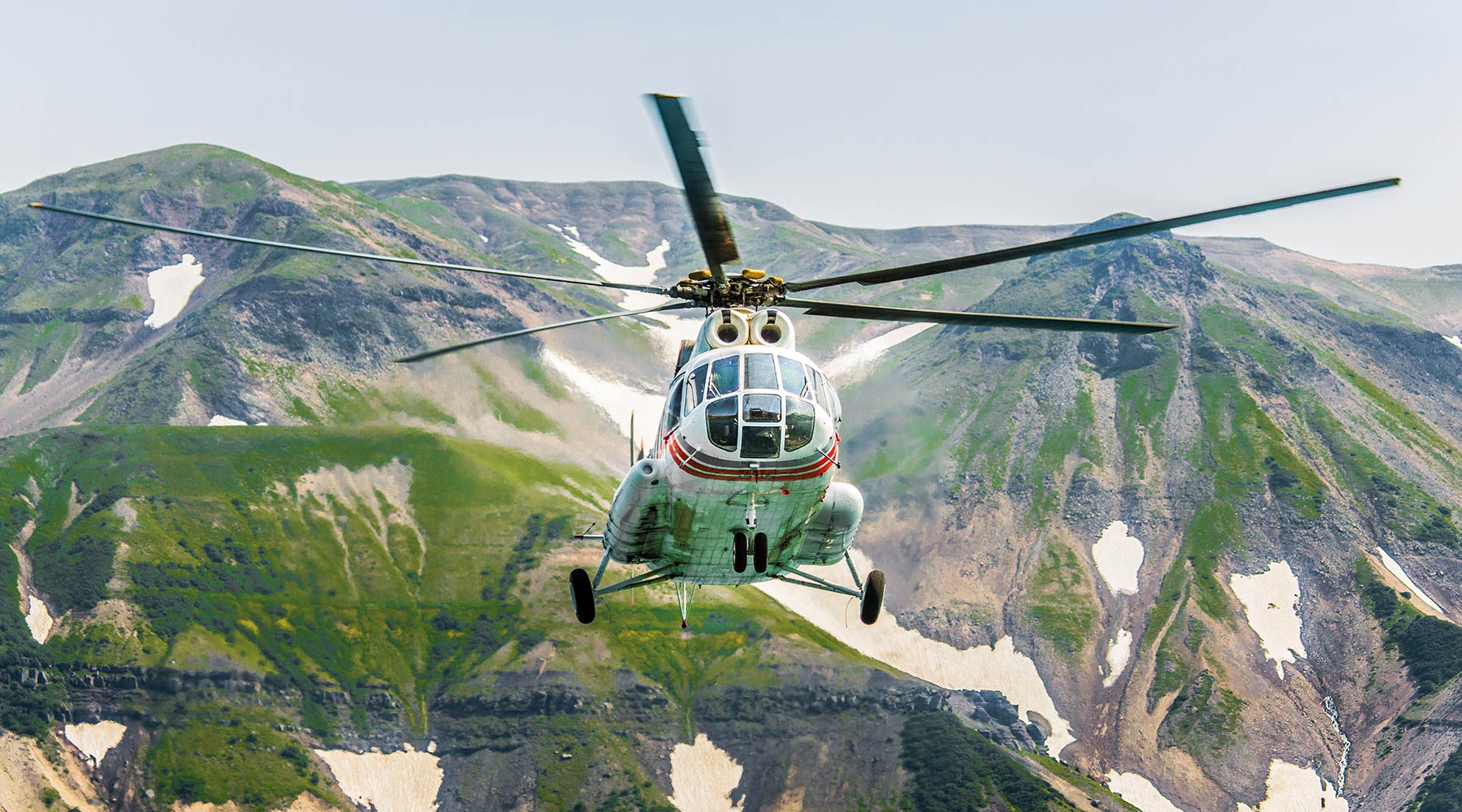
Women living on the edge of earth
Photographer and ethnographer Alegra Ally lived in a small yurt on the Siberian tundra to document a nine-months pregnant Nenets woman, Lena Khudi, her husband Lyonya, and their four-year-old daughter, Christine, during migration season.
October 21 – Yamal Peninsula, Northwest Siberia
I arrive in late autumn. The tundra seems vast and empty to the horizon. Only two dark pyramid-shaped “chums” (traditional Nenets’ tents) with tendrils of smoke rising from their tips stand out against the crisp blue sky.
No reindeer yet. Rather, I can hear the barking of dogs as they run between a chain of sledges. I look around, searching for the reindeer, but only the tundra greets me. As far as the eye can see, only brown earth and azure sky.

October 22
It’s my first morning in the chum, and I wake to unfamiliar surroundings. Whispering in a foreign language. I sneak a look from my warm sleeping bag and through the darkness I see the fur head cover of Lena. Above me dangles boots and clothing made of fur and reindeer hide. For a moment I’m overwhelmed with the knowledge that I will be spending the next 50 days living in these tight quarters with this family. I wonder how they must feel sharing their home with a stranger. These feelings are completely balanced with the knowledge that kindness, generosity, open hearts and gratitude are part of a universal language. No matter where we are born, we share these common human expressions. And so, the first moment we make eye contact, we are all sharing smiles.
November 10
We’ve been waiting for snow for weeks so we can migrate to the winter camp where the reindeer herd will have enough food and Lena’s family can settle in with their new infant. However, snow has been slow to arrive and the baby’s birth is impending. The plan has been for Lena to contact the Helicopter Department at the Salekhard as she nears her delivery date. The helicopter will transport her and her daughter Christina to this hospital, where she will stay for approximately 2-3 weeks to deliver her child and recover before returning by train, snow mobile and sledge back to the chum, a journey that takes 20 hours. Each day Lena can remain out in the tundra with her family is critical to their survival. Yet, time is running out and there is still much to be done.

November 20
The ice layer has gotten thicker during the past three days and Lyonya says that he would like to start the migration as soon as possible. To prepare, the several hundred reindeer must be herded into a tight circle for traveling. While the men lasso the herd, Lena helps by circling approximately 1000 reindeer, managing a large dog tethered to a long leash for several hours to keep the herd together until the lassoing is finished. The dog barks and in his enthusiasm runs around, tugging the leash and making the work even more difficult, as Lena has to continue pulling him back and controlling the pace of the walk. It is extremely tiring work which requires constant attention and physical strength and agility. Towards the end the dog pulls so hard that Lena slips and falls on her stomach. We reach her almost immediately, extremely worried. But she springs up, smiles, and assures us she is okay. She continues until the job is complete.
That night, Lena tells us that she will contact the helicopter to pick her up a day earlier as she feels her delivery is impending. Our plan is to migrate now and then when we are set up in the new camp, the helicopter will retrieve her to make the hospital transfer. The railways have been placed along the ancient migration routes, disrupting the migration patterns, but also provide an unintended benefit. There is cell reception within two kilometres of the tracks, and the Nenets often set up camp within short distances so they can access cellular service in the event of an emergency.

At 2am on the day we are supposed to begin the migration, Leo wakes me from a sound sleep. Lena is experiencing pain in her lower abdomen and believes they are contractions. Leo has called the village from his mobile phone and asked them to contact the helicopter in Salekhard. However, the helicopter cannot fly during the night so they have set arrival for daybreak, which this time of year does not occur until almost 10am. They’ve advised us to send for the nurse at the closest trading station, but reception is faulty and we cannot get through.
By 3:30 am, Lena clearly needs medical support and Leo is worried. He wants to contact the helicopter department again and try to convince them to make the night trip.
We are all now awake and waiting. Not one to panic in crisis, Lena begins to carefully pack her belongings. In addition to her personal necessities, she takes sewing tools, small boots and scraps of fur so she can work while she is in the hospital. When she is ready, Lena turns to me and my translator and asks us what we are going to do now after she is gone.

And then it hits me, the depth to which we simply cannot survive here without Lena.
Even the most basic acts for surviving in this landscape, such as making sure there is always a fire to keep us warm means not just placing fuel in the stove, but knowing where to find wood, where and how to cut it, how to find it when it is buried in ice and snow and when the supplies are exhausted in the near vicinity, how do we travel to the outlying areas to search for and collect more? This is only one basic element that Lena tends to daily. What of cooking and preparing food? These skills take time to learn and Leonya will not be able help us as he is wholly tending to the herd. We too, will have to go.
There is nothing left to do now but wait and for the next two hours we all get some rest. I wake again to the sound of a fire starting. While experiencing contractions, Lena remains committed to her responsibility as a mother, a wife, and also a host. While we are all still resting/sleeping, she gets up and places more wood in the stove to warm water for tea. It’s 7am and still dark outside.

Finally, the sun has risen, it’s 10am and the helicopter’s hovering presence overhead is a thunderous contrast to the daily stillness we’ve grown accustomed to. The pilot circles us twice then prepares to land. The entire process happens surprisingly fast. Upon landing, two officials jump out and approach Lena and begin to load her and Christina into the helicopter. Christina pulls back, frightened, but her father walks the family to the opening and sees them off. Just like that they are gone.
The tundra is eerily silent when the helicopter departs. Without Lena and Christina, the entire landscape feels abruptly stark and lonely. When we enter the chum it seems empty not only of bodies, but also of energy, and spirit. Outside, in line are the sledges packed and ready to travel for migration. But, without Lena we cannot move. It will be at least two weeks before she returns with her newborn and Christine. Everything must be unpacked and migration will be postponed. This could put the herd in jeopardy, as quality-grazing areas are difficult to come by, with the most sought after spots taken by the earliest migrating Nenets with the largest herds.
I wonder how Lyonya will manage without his partner, how will he possibly prepare food and keep the chum from freezing when he is required out with the reindeer herd for long hours?

One of many lessons I have learned during my time here is that the unexpected is every day. You can’t control a sudden snowstorm, a sick reindeer, or rain in November, but the way you prepare for possibilities and how you adapt to change are the keys to survival.
This was the day we prepared to migrate, and instead it is the day Lena and Lyonya’s child will be born. As the sun finds its place briefly overhead, I understand that the journey I will take now, while not planned, is something I am prepared for. We will travel eight hours by sledge and then snowmobile back to the village where Lena is about to give birth. There, I will wait and gather stories. But at this moment, the reindeer stand like stoics, painstakingly herded and ready to go. Their puffs of cloud breath visible against the crisp blue sky.
This is an excerpt from a story written by Kim Frank in Alegra Ally’s first person point of view using interviews and her field notes. This story, along with Ally’s photographs, was first published in Maptia, an independent storytelling platform.
Alegra Ally's book, New Path, is available through https://wildbornproject.com/book-pre-order/


